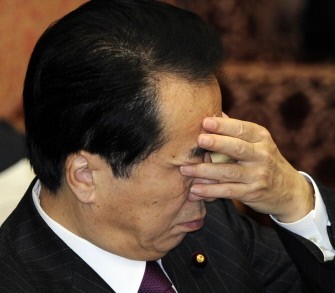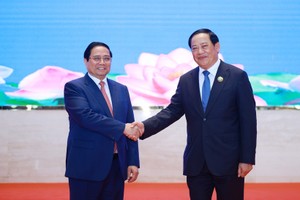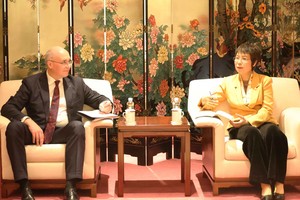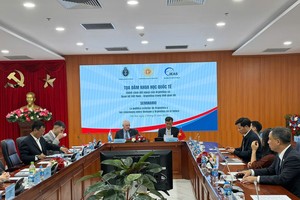TOKYO, March 7, 2011 (AFP) - Japan's Prime Minister Naoto Kan, weighed by low support ratings, is now "on the edge of a cliff" after his high-profile foreign minister quit over a funding scandal, newspapers said Monday.
"The Kan government faces its biggest crisis" since Kan took power in June last year as the second premier of his centre-left government, the liberal Mainichi Shimbun said in an editorial.
"They are in a crisis situation of whether the Kan government, or even the rule of the Democratic Party of Japan (DPJ), will collapse," it said a day after Seiji Maehara stepped down.
Maehara, 48, announced his resignation at a hastily arranged press conference late Sunday after he admitted he had received around 250,000 yen ($3,000) over recent years from an ethnic Korean who is not a citizen.

He had been seen as a likely successor to Kan, who has struggled in the face of support ratings below 20 percent and a split parliament that has threatened to derail his government's economic reform agenda.
Under Japanese law, it is illegal for politicians to accept donations from a foreign national and the scandal has been all the more damaging to Maehara, who as foreign minister had taken a hawkish and strongly patriotic stance.
The Nikkei business daily said "the Kan government is standing on the edge of a cliff after the foreign minister's resignation."
The conservative Yomiuri said "Prime Minister Kan has been driven into a tight corner" while the liberal Asahi said "the prime minister's political ground is bound to weaken further."
The DPJ swept to power in 2009 ending more than half a century of almost unbroken conservative rule.
Speaking in parliament on Monday, Kan said he had tried to persuade Maehara to stay on but said the former foreign minister was determined to go.
Chief Cabinet Secretary Yukio Edano would double as foreign minister for the time being. Edano said the government, once a new foreign minister was named, would strive to "overcome this unfortunate situation".
Maehara's departure spells a headache for Japanese diplomacy. Edano may find it difficult to juggle both roles, as he already acts as the government's top spokesman and premier's right-hand man.
Foreign ministers' talks of the Group of Eight developed nations are scheduled in Paris next week.
Japan was also to host foreign ministerial talks with China and South Korea this month but the schedule is now fluid, according to the foreign ministry.
Yoshinobu Yamamoto, political professor at Aoyama Gakuin University, noted that the sum of money Maehara took was "trivial".
"Mr Maehara needed to step down, given that the rules are the rules, that his post was foreign minister, and that (the donation) provided a good cue for opposition politicians playing political games to attack him," he said.
Maehara's resignation "made an already bad situation worse" for the government, Yamamoto told AFP, while adding he did not think his departure would lead to the fall of the government or snap elections soon.
"His wounds are light," leaving open the prospect for Maehara to become prime minister in the future, although not directly after Kan, he said.
The DPJ's popularity has waned because several of its 2009 election promises are not likely to be fulfilled, possible tax hikes and party in-fighting over a scandal-tainted veteran politician, Ichiro Ozawa.
Its push to join a budding trans-Pacific free trade pact is unpopular in rural districts, where especially rice farmers fear the removal of high tariff walls will bring a devastating flood of cheap imports.
"If general elections were held now, I think there would be a chance of returning to LDP rule," Yamamoto said, referring to the conservative Liberal Democratic Party ousted from power in 2009.
"It seems to me that the tax hikes and the move to free up trade are inevitable for the nation, but many people in Japan give priority to their own personal benefits," Yamamoto said.
"Japanese lack a strong leader to persuade them to overcome their personal interests."
























